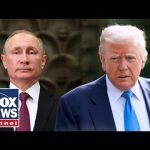President Trump has just touched down in Japan, making quite the entrance as he sets his sights on securing another monumental trade deal for the United States. This trip comes hot on the heels of recently concluded trade agreements with several Asian countries, including Thailand, Malaysia, Cambodia, and Vietnam. While those deals are stirring up excitement, the real buzz is all about the anticipated negotiations with China later in the week. It seems that Trump’s on a mission to elevate America’s economic standing, and his keen eye for trade opportunities is the driving force behind it all.
As experts analyze the recent trade agreements, one of the key points that stands out is the potential access to critical minerals. These minerals are vital for many modern technologies, and securing a stable supply is crucial. Industry insiders recognize that President Trump is paving the way for further resources from these Asian nations, which could free America from over-reliance on China. Although there’s still a long way to go, every little effort counts, and such deals could act as stepping stones toward greater self-sufficiency.
Interestingly, these trade agreements also reveal a persistent theme: protecting American intellectual property. The president is adamant about combating theft of American innovations and ideas, which have often been misappropriated and sold back to U.S. consumers. By encouraging other countries to enforce stricter measures against this type of fraud, the Trump administration is not just safeguarding American creativity; it’s also ensuring a level playing field for American companies looking to make their mark globally.
Yet, the main act is undoubtedly the upcoming U.S.-China talks, where stakes are exceedingly high. Treasury Secretary Scott Besson hinted at a substantial framework to help avoid the looming threat of 100% tariffs set for November 1st. While a one-year delay on China’s export controls on rare earth minerals may not seem like a monumental advancement, it is viewed as a necessary step in a complex negotiation. Given China’s firm stance, even a slight concession can have a significant impact on the trade landscape.
As Americans watch these negotiations unfold, many are left hopeful for a positive outcome. The battle to level the economic playing field may be ongoing, but the promise of better opportunities and fairer pricing is enough to give citizens a sense of calm. People want to believe that amidst the trade turbulence, there exists the potential for growth and success for American businesses. Each inked deal could indeed open doors for small businesses, giving them the chance to compete more effectively on the world stage, which is ultimately the heart of the matter. In the midst of all the trade talks and negotiations, one thing is clear: President Trump is determined to put America first, one deal at a time.




